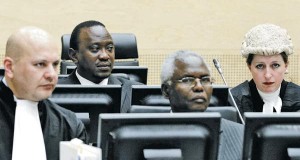I thoroughly investigated the International Criminal Tribunal for the former Yugoslavia in great detail for my dissertation. Therefore, I have an idea or two regarding what President Uhuru Kenyatta is likely to go through. As it is already widely known to those who love knowledge, the Serbs were not in the seat of power but controlled the military. The Bosniaks who were the majority (around 45%), had the head of state and government at the time when the Croatians pulled away. When the Bosniaks decided to create their own state too, the Serbs refused and fighting began. What happened thereafter is a tragedy. A series of massacres ensued where the Serbs unleashed military power on the largely Muslim Bosniaks, killing the men and boys as they raped the girls and women. The Bosniaks tried using militias to no avail. TheSrebrenica Massacre is perhaps the best known of the deadly killings that occurred in the former Yugoslavia.
There are numerous parallels between the former Yugoslavia and the Kenyan ICC case. President Uhuru Kenyatta’s case is extremely manageable, and I can confidently state here that he will sooner than later walk free with or without the cry of the prosecutors that there is no evidence. Like the Bosniaks who were outgunned by the Serbs and tried to form self-help militias, Uhuru Kenyatta is accused of bringing together young men (read Mungiki) to defend women and children who were being torched alive in churches in parts of Rift Valley. I want to strongly believe that elections were stolen. However, killing people from a certain tribe, because their man or woman stole elections, was not the path to pursue. The protests staged by the aggrieved party in the election rendered Kibaki’s government impotent to the point of not being able to protect those who were being attacked because of stolen elections. Similarly, the weapons of the Serbs made it impossible for the Bosniak government to restore order and protect the people. Self defense is protected under all constitutions worldwide and use of lethal force when one’s life is in danger is allowed. Under a failed government, Uhuru Kenyatta or any other person had the right to defend those who were under attack. The questions that saw Slobodan Milosevic and several other Serbian military leaders end up in jail are: Why were you attacking Bosniaks? If you had any grievance, why wouldn’t you use legal channels? These are the questions William Ruto will be asked. Together with Raila, you were right to protest after the rigged elections. Why did you not use the courts or any other legal and diplomatic channels? Why were people attacked and killed simply because elections were stolen? The loose tongues that spewed hate just before the vote, promising revenge were all caught on camera. This is not fiction. Ruto’s defense will have to be really strong to pull him out of this one.
This is a legal-non-partisan view based on international law scholarship. There are people who want to stupidly argue that Uhuru is guilty but that is only a figment of the imagination. I am not a fan of the President but that does not mean I condemn him based on my emotions. Such people include Prof. Makau Mutua and other extremely partisan scholars whose contribution to the table of informed dialogue is mere chaos.
The complication is only in local politics. Uhuru is already in bed with Ruto. But The Hague will force them to pursue separate paths. The worst case scenario will be when Uhuru’s team will have to argue that Ruto and Raila were busy adding fuel to the fire that was burning the nation prompting him to take the self-help initiative since the government was utterly dysfunctional. This is going to be the true test of the bromance between the duo (Uhuruto). If they survive it as brothers, the sentences will most likely break them apart. While Uhuru will walk free, Ruto is likely to have a difficult time, and like Charles Taylor, 50 is a possible successful bet.
So, did Uhuru play smart by going to The Hague? The answer is a resounding yes. Despite his inability to govern the country that happily elected him; he had nothing to fear in The Hague. The appearance before the judges painted him in good light-as the innocent man who has nothing to fear and is willing to face his accusers and expose them as malicious liars who have missed the facts, both in the moral sphere and the legal world. The challenge will be keeping his government together and succeeding for a second term in 2017 when Ruto is staring at 50. Not Days, YEARS! It is a tough spot to be in. This is arguably Ruto’s fight for his life. No kidding.
By Onchari Oyieyo
Onchari Oyieyo is an International Law Scholar based in the US.
He has studied at the University of Nairobi, Principia College, Harvard Law School, and New Mexico Highlands University.

